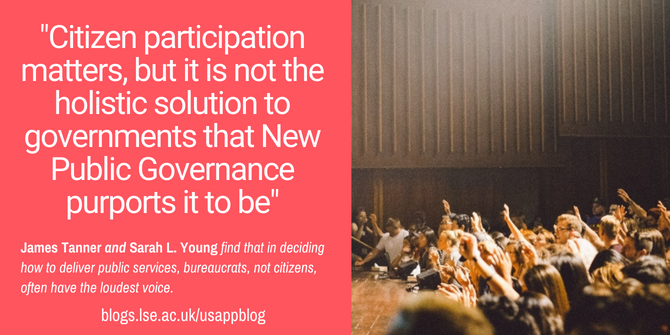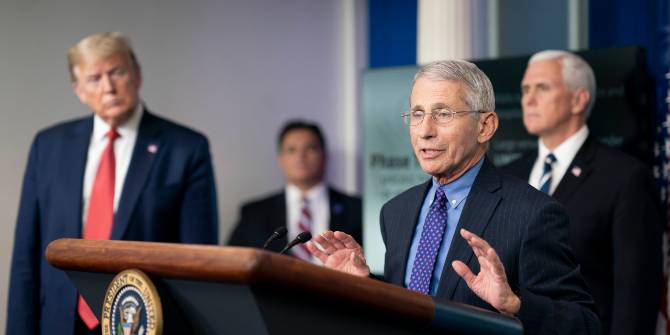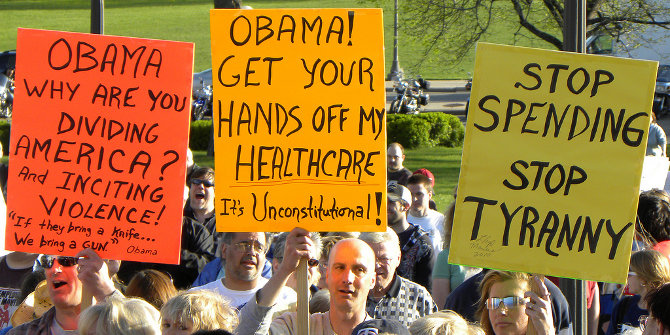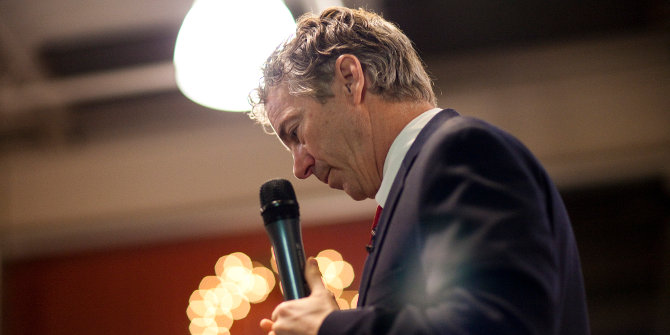Recent years have seen a growing movement for citizens to have a greater voice in how government services are designed and delivered – known as New Public Governance. In new research which examines regional advisory boards in the Department of Energy, James Tanner and Sarah L. Young find that when citizens and bureaucrats had similar political ideologies, citizens’ views had an influence on decision making, but when they disagreed, the agency favored bureaucrats’ opinions over citizens’ recommendations. They argue that while citizen participation matters, it may not be the holistic solution for governments that New Public Governance purports it to be.
There are many ways that citizens can participate in their governments; an important one is where people engage voluntarily with those who design how government services are delivered – public managers – in a wide variety of activities to produce those services. This method of public engagement has been increasingly prioritized as a gold standard, a magic elixir to solve government woes and correct system fragmentation. New Public Governance, a modern and widely accepted theory in public administration, is built upon the assumption that citizen participation in the policy process is even more important than the outcome of their involvement. This is because citizen participation is thought to improve community support for governments’ services.
In a competing thought line, bureaucratic discretion argues for giving public servants broad discretion over how to implement public policy. In this view, public servants are seen as experts who have the ability to choose the path they feel is best in pursuit of public goals. Yet, citizens and bureaucrats often do not always hold the same opinions about how government should produce public programs. Citizen participation and bureaucratic discretion are forces that can ultimately end up in competition for influence in how governments provide services. When citizens and bureaucrats hold different ideas about how governments should achieve shared goals, whose say matters more?
The Influence of Citizen Participation on Government
Citizens bring outside community-focused perspectives into the decision-making process. Their involvement in government improves citizen representation in public processes, making public programs more equitable and community-specific.
Citizen participation in government also improves community buy-in, and is often the precursor to the political support necessary for a program’s survival. In addition, citizen volunteers often become policy promoters, sharing their knowledge about the agency and its work. These citizen volunteers indirectly improve the community’s trust in government, which is paramount to democracy.
The Influence of Bureaucratic Discretion on Government
Bureaucrats are the public servants responsible for implementing policy goals. Bureaucratic discretion gives public servants subjective influence in the policy process. However, bureaucratic discretion includes more than public servants’ professional judgments; it also contains their personal biases and political ideology. For example, a 2018 study of Right to Information (RTI) requests in Uruguay found that bureaucrats personal biases against women often determined how an RTI would be fulfilled, or if the RTI would be fulfilled at all.
Additionally, public servants also work in political environments and are beholden to elected officials and political appointees. For example, different states within the United States had significantly different public management responses to the COVID-19 pandemic, which directly aligned with the states’ majority political party ideology. Bureaucratic discretion creates room for personal and political biases to have wide-ranging impacts on policy implementation.
Bureaucrats or Citizens, Whose Voice is the Loudest?
Both citizens and public administrators play critical roles in collaborative governance systems. In theory, these influences are supposed to work together to improve outcomes; akin to the idea that adding two minds together will find solutions that are even better than the summation of their individual brainpower. However citizens and bureaucrats do not always work together so harmoniously. These two groups may find themselves competing for a say over governments’ administrative decisions.
Thus, the question is not, “are bureaucrats biased?” or “does citizen participation matter?” because the answer to both questions is a resounding yes. Instead, the question is, “in a politically charged work environment filled with layers of administrators with personal biases, do citizens or bureaucrats have the louder voice?”
The Case of the United States Department of Energy Citizen Initiative
The U.S. Department of Energy (USDOE) Environmental Management Site Specific Advisory Board was created in 1994 to engage community members in the process of cleaning up nuclear facilities. Eight regional boards, consisting of citizen volunteers reflective of their communities, provide recommendations to the USDOE on the clean-up of facilities previously used for nuclear weapon production. This initiative created a natural experiment to test whether citizens or bureaucrats have more say over the government’s administrative decisions since both the citizens and the DOE site administrators have had many opportunities to influence the USDOE’s outcome. We conducted a multi-step mixed-method analysis of meeting minutes and recommendation documents from one of the regional boards, the Savannah River Site Board. We assessed more than ten years of data from this board by identifying instances of political ideological differences between citizens and bureaucrats, weighing the influence of the citizens and the bureaucrats, and statistically testing instances of specific policy competition between the two groups.
Citizen Participation Matters. Bureaucratic Discretion Matters More.
We found that citizens are comfortable expressing their perspectives, even in very technically based work where citizens have little outside knowledge. Even in a highly scientific environment where non-specialists could be easily influenced by scientific expertise, citizen volunteers held decidedly distinct opinions from bureaucrats. When citizens and bureaucrats had similar political ideologies, citizens’ views influenced the agency’s administrative decision-making. This finding is good news in that it confirms citizen participation does matter.
However, citizens and bureaucrats do not always agree. When citizens and bureaucrats disagree on the work of government, the agency tends to reject the recommendation of citizens who are volunteering their time and effort and adopt policies aligned with the bureaucrats’ opinions. Ultimately, citizens’ opinions have less influence on governments’ decisions when the citizens’ and bureaucrat’s political ideologies are not aligned.

Photo by Edwin Andrade on Unsplash
Why Does This Matter for Practitioners?
1) Citizen participation takes time and money for governments to implement, both of which are finite, limited resources.
Engaging citizen volunteers requires significant time and resources for governments and their public servants. The benefits must outweigh the costs to justify any government program. While there are many benefits to engaging citizens in the work of government, we need to rethink how we engage citizen volunteers if the ways we are currently doing so do not result in these benefits. The tenets of good volunteer management must apply. Public managers should look toward the lessons learned by their nonprofit colleagues and find new, more meaningful ways to engage citizens in mutually beneficial ways.
2) There are risks to superficially involving citizen volunteers
Citizen volunteers donate their time and effort to participate in government initiatives. Organizations should not ask individuals to do this and then devalue that investment by not respecting the individuals’ input. Doing so demonstrates a lack of respect for the individual, which can harm the organization. The nonprofit volunteer literature is clear that underappreciated volunteers become dissatisfied, which can lead to them becoming public organizational adversaries. Public managers must ensure that citizen volunteers feel appreciated. Otherwise, the agency risks destroying the goodwill created by the engagement. Citizen disillusionment can eventually threaten democracy.
3) Public agencies must be upfront from the beginning about how citizen input will be utilized
Even when an agency’s resources are effectively utilized to engage citizen volunteers in meaningful ways, that input may not always be a part of the final policy decision. Citizens are reasonable people who will understand that their recommendations may not always work. Effectively explaining why citizens’ suggestions could not be incorporated in the final product will go a long way to mitigate any potential disillusionment. In short, the agency owes citizens an explanation when their input is disregarded and will be better off in the long run by doing so.
Why Does This Matter for Scholars?
1) The process may not be more important than the outcome
New Public Governance theory argues that the process of involving citizens in the work of government is more important than the outcome. However, the pivot point to any functioning public governance network is the delicate balance of power between its members. Bureaucrats and citizen volunteers do not have the same levels or sources of influence and power. We must stop pretending that bureaucrats are entirely apolitical individuals devoid of opinions or influence over government. Instead, we must recognize and find better ways to embrace their knowledgeable influence and rebalance the power within public governance networks.
2) We are not done searching for good theory
Bureaucratic discretion is not a bad thing. Citizen participation matters, but it is not the holistic solution to governments that New Public Governance purports it to be. We must find new ways to embrace the tension between bureaucratic discretion and citizen participation and better incorporate it into public governance practices. We are not done searching for holistic public administration theory. Public administration practitioners need better theories to balance these tensions and reflect what is happening in practice. Governments have faced recent demands to modernize because of rapid social change. Our public administration theories must also be revolutionized.
- This article is based on the paper, “Citizen participation matters. Bureaucratic discretion matters more” in Public Administration.
- Please read our comments policy before commenting.
Note: This article gives the views of the author, and not the position of USAPP – American Politics and Policy, nor the London School of Economics.
Shortened URL for this post: https://bit.ly/3CtCOng






